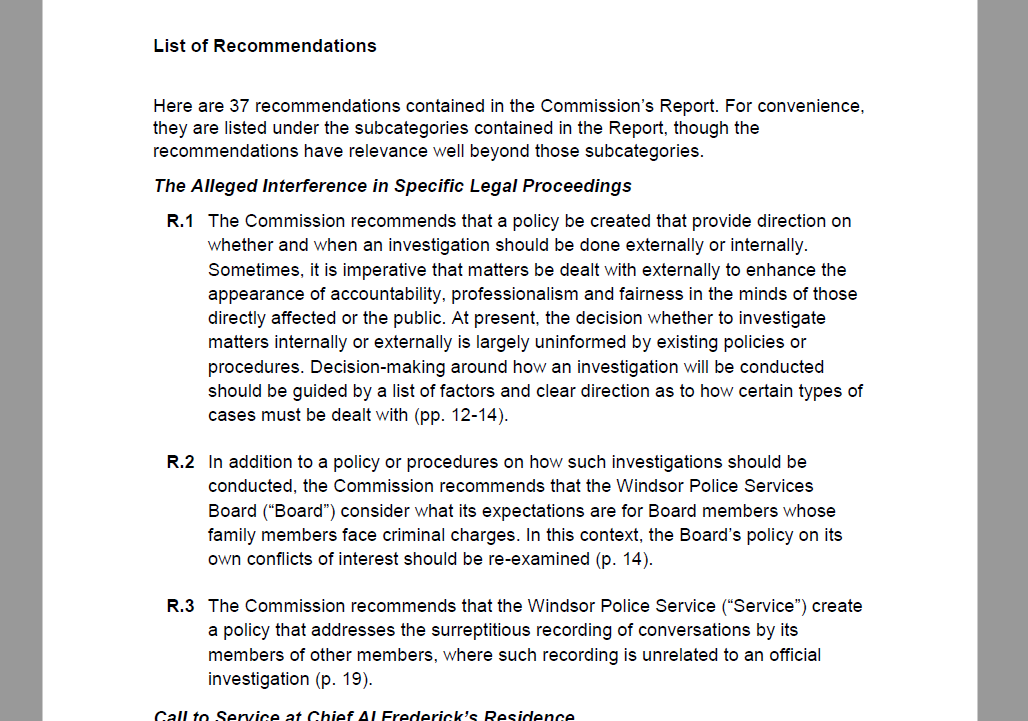On August 7th (Friday), the Report of the Ontario Civilian Police Commission: The Windsor Police Service and The Windsor Police Services Board was made public : (PDF or HTML). Over the weekend, I gave the report a read and found these points particularly interesting to me:
From the section, The Fairness of Promotional Processes (p. 27)
“Statements made by former and current officers included the following: Officers are more likely to be successful in promotions if they served a rotation in the TAC Unit or in the Investigations Unit. This success is said to reflect the backgrounds of senior management in the TAC Unit or the Investigations Unit… The preference for officers from the TAC Unit has limited the promotion of women as no woman has ever been assigned to the TAC Unit … Women are not encouraged to apply for the TAC Unit while men are encouraged to train and run the course with TAC members.”
And on page 32:
“Nevertheless, the Commission recommends the Service examine, in a comprehensive way, the competencies for promotion. As police services move from more traditional, paramilitary models to community-based policing, they must evaluate the emphasis placed on certain competencies in preference to others. Chief Frederick acknowledged this exercise should take place. He believes competencies have not kept up with new approaches in policing. Simply put, policing is changing, and the Service needs to change with it. Very recent events, including George Floyd’s death, the arrest of Minneapolis officers, and the protests that follow, undoubtedly reinforce the timeliness of reexamining competencies in policing. In our view, the Board should play an important role in overseeing how the Service re-evaluates how competencies are weighed and evaluated.
This report is a very carefully written one. Almost every point is qualified. I say to explain why I found the last sentence of this passage found on page 35 as so damning:
“This Report cannot speak with any precision about the extent to which female officers continue to be regularly exposed to discriminatory, sexist conduct. A police service is only successful if it equally values men and women –indeed, all its officers and employees regardless of sex, gender identity or expression, and other bases for discrimination set out in the Human Rights Code. A police service is only successful if it makes officers accountable, regardless of rank, for discriminatory conduct, whether that conduct involves sexist comments, jokes, inappropriate questions, or other forms of harassment. The Service has yet to prove that officers are truly made accountable for discriminatory conduct.”
There’s a lot in the section Workplace Harassment and Accommodation Issues. I found these passages pertaining to the insufficient oversight of the Board as single-eyebrow-raising. On page 46 is this allegation which was raised by either the complainants or in interviews the Commission conducted with other officers:
The Board Chair has financially settled several human rights complaint files without the knowledge of other Board members. Board members are not provided with regular updates related to matters before the Human Rights Tribunal. Only the Board Chair is regularly aware of what is before the Human Rights Tribunal and the legal costs associated with human rights complaints.
On page 56, The Role of the Board’s Chair and Board Oversight addresses this allegation. Somewhat.
We saw no evidence whatsoever that the Board is corrupt or that its Chair acts improperly. Some questioned whether the Chair played too large a role in decision-making before the Board was consulted. In fairness, no Board member expressed that view directly to us. The current Chair has a strong personality. However, he is respected by his fellow Board members.
(However?)
Here’s the response of the Commission:
The Commission saw evidence that the settlements of human rights complaints are not necessarily approached in a consistent way. It was sometimes difficult to reconcile the approach of the Board and the Service to various human rights complaints. The Board should develop some guidelines on the considerations that should inform its decision-making around human rights settlements. There should be a regular review by the Board of ongoing human rights complaints and the lessons learned in individual cases. When a human rights complaint reveals a larger issue to be addressed, the Service and the Board must be transparent in acknowledging the existence of that issue to the Service’s members as a whole, and in identifying how the Service and/or Board have addressed the issue.
I don’t understand why The Commission is being so very delicate in the first sentence of the next paragraph:
Some of the systemic issues identified in this Report also invite consideration of the Board’s role in providing robust oversight of the Service. For example, the Service’s Accommodation Directive and Workplace Harassment Directive had not been reviewed on an ongoing basis, despite requirements for review in the Directives themselves. The Board did not develop its policy on investigating the Chief or Deputy Chiefs for an extended period of time, and the ultimate development of that policy was prompted, in part, by media scrutiny. The Board appeared, at times, to accept, without sufficient scrutiny, what it was told by the Service.
There is a lot going on in this report. The Commission points to a variety of inter-related issues that the WPS as an organization needs to improve on. The language in the report is measured to the point of under-statement which have left some WPS officers disappointed.
One thing I am happy to have learned is that apparently the OCPC is going to ask for a report from the WPS Board on the organization’s progress towards its 37 recommendations in a year’s time. I hope there’s at least one local reporter out there who has put a reminder in their calendar to follow up with the Board to ask for a copy of this future report in August of 2021.
If there is no considerable movement from the Board of Governors of the Windsor Police Board on this portfolio, it suggests to me that the City of Windsor deserves a new chair of the WPS Board.


Comments are closed.